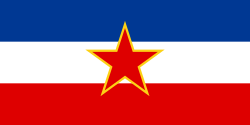| Yugoslavia at the 1959 Mediterranean Games | |
|---|---|
 | |
| IOC code | YUG |
| NOC | Yugoslav Olympic Committee |
| in Beirut | |
| Medals Ranked 5th |
|
| Mediterranean Games appearances (overview) | |
| Other related appearances | |
Yugoslavia competed at the 1959 Mediterranean Games held in Beirut, Lebanon.